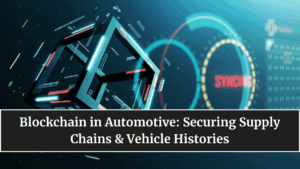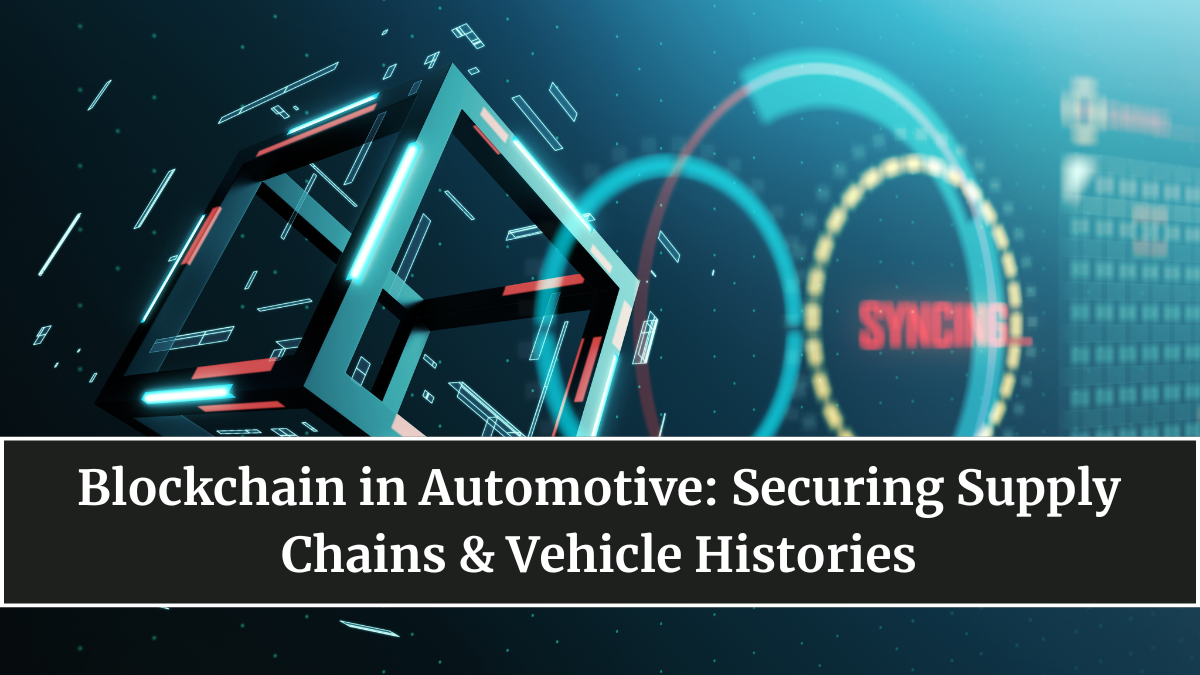In 2025, blockchain technology is no longer confined to the world of cryptocurrency — it has firmly entered the automotive industry, reshaping how vehicles are manufactured, tracked, and sold. With data breaches, counterfeit parts, and fraudulent resale practices on the rise, blockchain is emerging as the digital backbone of trust in automotive operations.
From securing supply chains to verifying vehicle ownership histories, blockchain offers the transparency and reliability that the modern mobility ecosystem demands. Automakers are rapidly adopting this decentralized ledger system to bring accountability and real-time visibility across their global networks.

What Makes Blockchain Ideal for the Auto Industry
At its core, blockchain is a distributed database that stores records in a series of encrypted “blocks,” each linked to the previous one — making it immutable and tamper-proof. This ensures that once a transaction or record is added, it cannot be altered without consensus across the network.
In the automotive world, this means:
-
Every part, transaction, and service log can be recorded securely.
-
Vehicles can carry digital fingerprints detailing their entire lifecycle.
-
Stakeholders — from manufacturers to buyers — can trust the authenticity of every data point.
By replacing paper-based systems and siloed digital records, blockchain creates a single source of truth accessible to all authorized parties.
Securing Automotive Supply Chains
One of the biggest challenges automakers face is tracking components through vast and complex supply chains that span multiple countries. Counterfeit parts not only damage brand credibility but also pose serious safety risks.
Blockchain addresses this problem by providing end-to-end part traceability. Every supplier, manufacturer, and logistics partner can log verified data on the blockchain — including production dates, batch numbers, certifications, and shipment records.
Benefits of blockchain-enabled supply chains:
-
Instant verification of part authenticity.
-
Automated alerts for recalls or defects.
-
Reduced fraud and duplication in component sourcing.
-
Transparent supplier audits with real-time updates.
Major automakers like BMW, Ford, and Mercedes-Benz are already implementing blockchain platforms to trace raw materials like cobalt and lithium, ensuring ethical and sustainable sourcing.
Transparent Vehicle Ownership & History
Blockchain is also revolutionizing the used car market, long plagued by odometer fraud and fake ownership transfers. By storing ownership records, accident history, and service logs on a blockchain, every vehicle now comes with a verifiable digital passport.
Key applications include:
-
Ownership Authentication: Prevents duplicate or fake vehicle registration.
-
Maintenance Records: Permanent logs of repairs and service history.
-
Insurance Claims: Instant validation of claim authenticity.
-
Resale Transparency: Buyers can confirm the complete lifecycle of a vehicle before purchase.
This immutable record builds buyer confidence and simplifies transactions between owners, insurers, and dealers.
Blockchain and Automotive Financing
Financing and leasing transactions are another area where blockchain adds immense value. Smart contracts — automated agreements coded into the blockchain — ensure that all parties fulfill terms before payments are released.
This leads to:
-
Faster loan approvals and reduced paperwork.
-
Fraud prevention through transparent payment trails.
-
Instant asset verification for lenders and insurers.
Some automotive finance startups are even using blockchain-based digital tokens to represent vehicle assets, making fractional ownership and car subscription models more accessible.
Enhancing Vehicle Data Security and Connectivity
Connected cars constantly generate sensitive data — from GPS routes to driver behavior patterns. Without strong security, this data can be vulnerable to cyberattacks or misuse. Blockchain provides a solution by encrypting and decentralizing data storage, giving vehicle owners greater control over who accesses their information.
For example:
-
Each vehicle can function as a node on the blockchain network.
-
Drivers decide which apps or insurers can access their data.
-
OTA (over-the-air) updates and diagnostics can be securely logged and verified.
This decentralized security approach eliminates the single-point vulnerabilities of traditional cloud systems, ensuring privacy and data integrity.
Challenges in Blockchain Adoption
While promising, the automotive blockchain revolution faces a few roadblocks:
-
Scalability: Processing millions of daily transactions requires high computational power.
-
Standardization: Lack of global frameworks for blockchain interoperability.
-
Regulatory Clarity: Varies across countries regarding digital contracts and tokenized assets.
-
Cost: Implementing and maintaining blockchain infrastructure is still expensive for small players.
Despite these hurdles, collaborations between automakers, tech firms, and regulators are quickly paving the way for standardized blockchain ecosystems.
The Road Ahead: From Transparency to Trust
By 2030, blockchain will become an essential layer of automotive infrastructure — powering digital vehicle identities, smart contracts, and real-time ecosystem auditing. The result will be an auto industry that is transparent, ethical, and efficient.
Key trends shaping the future:
-
Universal blockchain registries for all new vehicles.
-
Seamless integration with AI-driven predictive maintenance.
-
Global adoption of decentralized vehicle identification numbers (VINs).
-
Cross-industry blockchain alliances linking auto, insurance, and energy sectors.
As cars grow smarter and more connected, blockchain ensures that their data — and the systems they depend on — remain trustworthy, verifiable, and secure.
FAQs
What is blockchain in the automotive industry?
It’s a decentralized technology used to record vehicle data, supply chain transactions, and ownership details securely and transparently.
How does blockchain improve supply chain security?
It tracks parts from the manufacturer to the end user, ensuring authenticity and preventing counterfeit components.
Can blockchain help in used car sales?
Yes. It provides transparent ownership and maintenance histories, reducing fraud in the resale market.
Is blockchain used in vehicle financing?
Absolutely. Smart contracts automate lending, leasing, and payment processes securely.
Will blockchain become standard in all cars?
By 2030, most major automakers are expected to adopt blockchain for identity verification, maintenance records, and connected data management.
Click here to know more.
